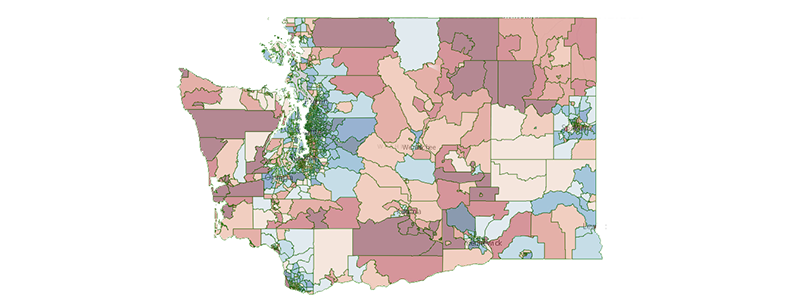||| FROM STATE DEPARTMENT OF HEALTH |||
OLYMPIA – The Washington State Department of Health (DOH), in collaboration with the University of Washington, announces new interactive mapping tools to help utilities improve environmental health equity as they transition to cleaner energy generation. These tools identify communities in Washington that are disproportionately impacted by fossil fuel pollution and vulnerable to climate change impacts so that these inequities can be addressed.
The new tools provide utilities with localized data on the environmental, health and climate risks communities face, supporting decisions that advance environmental justice in the state’s shift away from fossil fuels.
DOH analysis shows that 54 out of 64 electrical utilities in Washington contain communities highly impacted by fossil fuel pollution and other risk factors. Utilities will use these data to address inequities as they transition to cleaner energy sources.
Communities are “highly impacted” if they rank a nine or ten on the Environmental Health Disparities map. This map captures exposure to pollution, fossil fuels, and other environmental hazards as well as social vulnerability factors such as income and race. Added to the map are new climate projections which show distribution of risks from climate change, which will help guide utilities’ efforts.
The Clean Energy Transformation Act (CETA), passed by the Washington State Legislature in 2019, focuses on making energy cleaner and healthier. One component of that process requires DOH to identify communities that are unfairly burdened by environmental risk factors and climate change impacts. Utilities, under the guidance of the Department of Commerce (Commerce) and the Utilities and Transportation Commission (UTC), will use this information to ensure the benefits of transitioning to green energy are more equitably distributed across communities.
“Having accurate, community-level data about environmental risks is critical to inform decisions by policymakers on funding priorities, environmental policy and strategies to help communities disproportionately impacted by pollution,” said Dr. Jeremy Hess, director of the University of Washington Center for Health and the Global Environment (CHanGE). “This work is part of CHanGE’s mission to promote the health benefits of climate action and support key decisions in climate change mitigation and adaptation. We are committed to working with our partners to build on these tools going forward,” Hess said.
“This is one step toward helping our communities whose health is most impacted by environmental concerns, by focusing resources to help them with the transition to clean energy in Washington,” says Environmental Public Health Senior Epidemiologist Jennifer Sabel.
DOH will host a webinar for utilities and the interested public illustrating how to use the tools on Tuesday, March 16 from 1-2:30 PM. Click here to register.
CETA commits Washington to an electricity supply free of greenhouse gas emissions by 2045.
The climate projection data is the result of a collaboration between DOH, CHanGE, the UW Department of Environmental & Occupational Health Sciences and the UW Climate Impacts Group.
**If you are reading theOrcasonian for free, thank your fellow islanders. If you would like to support theOrcasonian CLICK HERE to set your modestly-priced, voluntary subscription. Otherwise, no worries; we’re happy to share with you.**







